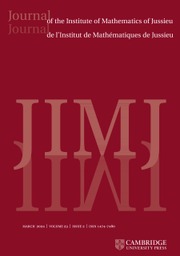Crossref Citations
This article has been cited by the following publications. This list is generated based on data provided by
Crossref.
Boutet de Monvel, Anne
and
Shepelsky, Dmitry
2004.
Initial boundary value problem for the mKdV equation on a finite interval.
Annales de l'Institut Fourier,
Vol. 54,
Issue. 5,
p.
1477.
Monvel, Anne Boutet de
and
Kotlyarov, Vladimir
2005.
Characteristic Properties of the Scattering Data for the mKdV Equation on the Half-Line.
Communications in Mathematical Physics,
Vol. 253,
Issue. 1,
p.
51.
Fokas, A. S.
2005.
The generalized Dirichlet-to-Neumann map for certain nonlinear evolution PDEs.
Communications on Pure and Applied Mathematics,
Vol. 58,
Issue. 5,
p.
639.
Pelloni, B.
2006.
Encyclopedia of Mathematical Physics.
p.
346.
Monvel, Anne Boutet de
Fokas, Athanassis S.
and
Shepelsky, Dmitry
2006.
Integrable Nonlinear Evolution Equations on a Finite Interval.
Communications in Mathematical Physics,
Vol. 263,
Issue. 1,
p.
133.
Pinotsis, Dimitrios A.
2007.
The Riemann-Hilbert Formalism For Certain Linear and Nonlinear Integrable PDEs.
Journal of Nonlinear Mathematical Physics,
Vol. 14,
Issue. 3,
p.
474.
TREHARNE, P. A.
and
FOKAS, A. S.
2007.
Initial-boundary value problems for linear PDEs with variable coefficients.
Mathematical Proceedings of the Cambridge Philosophical Society,
Vol. 143,
Issue. 1,
p.
221.
de Monvel, A. B.
Kotlyarov, V.
and
Shepelsky, D.
2008.
Decaying Long-Time Asymptotics for the Focusing NLS Equation with Periodic Boundary Condition.
International Mathematics Research Notices,
Boutet de Monvel, Anne
and
Shepelsky, Dmitry
2008.
The Camassa–Holm Equation on the Half-Line: a Riemann–Hilbert Approach.
Journal of Geometric Analysis,
Vol. 18,
Issue. 2,
p.
285.
Treharne, P. A.
and
Fokas, A. S.
2008.
The Generalized Dirichlet to Neumann Map for the KdV Equation on the Half-Line.
Journal of Nonlinear Science,
Vol. 18,
Issue. 2,
p.
191.
Fokas, A S
2009.
Lax pairs: a novel type of separability.
Inverse Problems,
Vol. 25,
Issue. 12,
p.
123007.
de Monvel, Anne Boutet
Its, Alexander
and
Kotlyarov, Vladimir
2009.
Long-Time Asymptotics for the Focusing NLS Equation with Time-Periodic Boundary Condition on the Half-Line.
Communications in Mathematical Physics,
Vol. 290,
Issue. 2,
p.
479.
Boutet de Monvel, Anne
and
Shepelsky, Dmitry
2009.
Long time asymptotics of the Camassa–Holm equation on the half-line.
Annales de l'Institut Fourier,
Vol. 59,
Issue. 7,
p.
3015.
Kotlyarov, Vladimir
and
Minakov, Alexander
2010.
Riemann–Hilbert problem to the modified Korteveg–de Vries equation: Long-time dynamics of the steplike initial data.
Journal of Mathematical Physics,
Vol. 51,
Issue. 9,
Kalimeris, K.
and
Fokas, A. S.
2010.
The Heat Equation in the Interior of an Equilateral Triangle.
Studies in Applied Mathematics,
Vol. 124,
Issue. 3,
p.
283.
de Monvel, Anne Boutet
Kotlyarov, Vladimir P
Shepelsky, Dmitry
and
Zheng, Chunxiong
2010.
Initial boundary value problems for integrable systems: towards the long time asymptotics.
Nonlinearity,
Vol. 23,
Issue. 10,
p.
2483.
Moskovchenko, E A
and
Kotlyarov, V P
2010.
Periodic boundary data for an integrable model of stimulated Raman scattering: long-time asymptotic behavior.
Journal of Physics A: Mathematical and Theoretical,
Vol. 43,
Issue. 5,
p.
055205.
Hitzazis, Iasonas
and
Tsoubelis, Dimitri
2010.
The Korteweg–de Vries equation on the interval.
Journal of Mathematical Physics,
Vol. 51,
Issue. 8,
Boutet de Monvel, Anne
and
Shepelsky, Dmitry
2010.
The Camassa–Holm equation on the half-line with linearizable boundary condition.
Comptes Rendus. Mathématique,
Vol. 348,
Issue. 13-14,
p.
775.
Fokas, A S
and
Lenells, J
2010.
Explicit soliton asymptotics for the Korteweg–de Vries equation on the half-line.
Nonlinearity,
Vol. 23,
Issue. 4,
p.
937.

